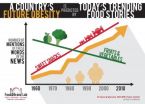One night of sleep loss can alter clock genes in your tissues
2015-07-21
(Press-News.org) Swedish researchers at Uppsala University and the Karolinska Institute have found that genes that control the biological clocks in cells throughout the body are altered after losing a single night of sleep, in a study that is to be published in the Journal of Clinical Endocrinology and Metabolism.
"Previous research has shown that our metabolism is negatively affected by sleep loss, and sleep loss has been linked to an increased risk of obesity and type 2 diabetes. Since ablation of clock genes in animals can cause these disease states, our current results indicate that changes of our clock genes may be linked to such negative effects caused by sleep loss", says Jonathan Cedernaes, lead author on the study and a researcher at Uppsala University.
For the study the researchers studied 15 healthy normal-weight men who on two separate occasions came to the lab for almost 2-night long stays. During the second night the participants slept as usual (over 8 hours) in one of the two sessions, while they were kept awake in the other of these sessions, but in random order. To minimize the influence of various environmental factors, light conditions, food intake and activity levels in the lab were strictly controlled and the participants were bed-restricted when they were kept awake.
Following the second night on both occasions that the men were studied, small tissue samples were taken from the superficial fat on the stomach, and from the muscle on the thigh - two kinds of tissues that are important for regulating metabolism and controlling blood sugar levels. Blood samples were also taken before and after the participants had consumed a sugar solution to test their insulin sensitivity, a practice commonly done to exclude the presence of diabetes or a metabolic state called impaired insulin sensitivity, which can precede type-2 diabetes.
Molecular analyses of the collected tissue samples showed that the regulation and activity of clock genes was altered after one night of sleep loss. The activity of genes is regulated by a mechanism called epigenetics. This involves chemical alterations to the DNA molecule such as methyl groups - a process called methylation - which regulates how the genes are switched on or off. The researchers found that clock genes had increased numbers of such DNA marks after sleep loss. They also found that the expression of the genes, which is indicative of how much of the genes' product is made, was altered.
"As far as we know, we are the first to directly show that epigenetic changes can occur after sleep loss in humans, but also in these important tissues", says Dr. Cedernaes. "It was interesting that the methylation of these genes could be altered so quickly, and that it could occur for these metabolically important clock genes", he continues.
The changes that the researchers observed were however different in the adipose tissue and the skeletal muscle. "This could suggest that these important molecular clocks are no longer synchronized between these two tissues", Dr. Cedernaes says. "As such, 'clock desynchrony' between tissues has been linked to metabolic pathologies, this could suggest that these tissue-specific changes were linked to the impaired glucose tolerance that our participants demonstrated after the night that they had been kept awake"
The researchers do not at this stage know how persistent these changes are. "It could be that these changes are reset after one or several nights of good sleep. On the other hand, epigenetic marks are suggested to be able to function a sort of metabolic memory, and have been found to be altered in e.g. shift workers and people suffering from type 2 diabetes", Dr. Cedernaes points out. "This could mean that at least some types of sleep loss or extended wakefulness, as in shift work, could lead to changes in the genome of your tissues that can affect your metabolism for longer periods", Dr. Cedernaes concludes.
INFORMATION:
ELSE PRESS RELEASES FROM THIS DATE:
2015-07-21
TORONTO, ON - When Julie compares her husband George to her friend's husband Sam, she can't help but notice that Sam is better is better at helping his children with homework. But rather than be upset about George's shortcomings in the children's homework arena, Julie reasons that since she enjoys doing homework with their children, it's not that important that George do it.
What Julie has just done is protect her partner (and their relationship!) from the negative implications of her own comparison. But not all members of a couple engage in these justifying explanations ...
2015-07-21
Information embedded within DNA has long contributed to biodiversity conservation, helping to reconstruct the past history of species, assess their current status, and guide strategies for their protection. A new study shows that the entire genome of hard to study species may now be available to scientists without the need to handle or even see their study organism, opening up the field of conservation genomics to the use of non-invasive sampling techniques.
Endangered and elusive species by definition may be both rare and difficult to locate. As a result, conservation ...
2015-07-21
COLUMBUS, Ohio - If there's one thing advertisers think they know, it is that sex and violence sell.
A new analysis, however, provides some of the best evidence to date that this widely accepted adage just isn't true.
Researchers analyzed the results of 53 different experiments (a so-called meta-analysis) involving nearly 8,500 people, done over 44 years. All of these experiments examined some facet of the question of whether sexual or violent media content could help sell advertised products.
When all the results are considered together, the overall conclusion, with ...
2015-07-21
'Fatherhood effect' is average weight gain of 3.5 to 4.5 pounds
Non-fathers lose weight during same time period
Key time for pediatricians to counsel fathers, who often don't have their own doctors
CHICAGO --- All those leftover pizza crusts you snatch from your kids' plates add up. Men gain weight after they become fathers for the first time whether or not they live with their children, reports a large, new Northwestern Medicine study that tracked the weight of more than 10,000 men from adolescence to young adulthood.
The typical 6-foot-tall man who lives ...
2015-07-21
Juvenile inmates are much more likely to be hospitalized for mental health problems than children and teenagers who are not incarcerated, according to a new study from the Stanford University School of Medicine.
In addition, the hospital stays of these inmates are longer, suggesting that their underlying mental health problems are worse.
The new study, which will be published online July 21 in the Journal of Adolescent Health, examined almost 2 million hospitalizations of California boys and girls over a 15-year period. Mental health diagnoses were responsible for ...
2015-07-21
CHARLOTTESVILLE, VA (JULY 21, 2015). French researchers used clinical examinations and magnetic resonance imaging (MRI) studies to determine whether retired professional rugby players experience more serious symptoms of cervical spine degeneration than people in the general population. To the best of the authors' knowledge, this is the largest study of its kind covering any professional contact sport, and it confirms greater cervical spine degeneration in former rugby players. The research findings are reported and discussed in the article, "Clinical and radiological cervical ...
2015-07-21
ANN ARBOR, Mich. -- It's a tale of two tests: one for early signs of cervical cancer, the other for a sexually transmitted disease. But a new study suggests that a change in the recommended schedule for one may have dramatically lowered the chances that young women would get the other.
Results published by a University of Michigan team shows the unintended consequences of changes to national health test guidelines: the potential for doctors to fall behind on ordering other tests that screen for serious health problems.
In this case, the two tests are Pap smears and ...
2015-07-20
What you're reading now secretly tells you whether your country will be skinnier or fatter in three years. After analyzing 50 years of all the food words mentioned in major newspapers like the New York Times and London Times, a new Cornell study shows that the food words trending today in 2015 will predict a country's obesity level in three years - in 2018.
"The more sweet snacks are mentioned and the fewer fruits and vegetables that are mentioned in your newspaper, the fatter your country's population is going to be in 3 years, according to trends we found from the past ...
2015-07-20
(PHILADELPHIA) -- African American men are more likely to develop prostate cancer than European American men, and are also more than twice as likely to die from it. Although there are many reasons that contribute to this health disparity, new research shows that African American men may have a distinctly different type of prostate cancer than European American men, according to new genomic fingerprinting results.
"This study, this line of research, is about finding better and more appropriate therapies for African American men," says corresponding author of the study, ...
2015-07-20
Both prescription and illegal drugs that are abused have been found in Canadian surface waters. New research shows that wastewater discharges flowing downstream have the potential to contaminate sources of drinking water with these drugs at relatively low concentrations.
The concentrations of cocaine, morphine, and oxycodone did not decline with distance downstream from the wastewater treatment plant discharge, and many of the drugs were not removed effectively by drinking water treatment plants.
The research is part of a special section on pharmaceuticals in the journal ...
LAST 30 PRESS RELEASES:
[Press-News.org] One night of sleep loss can alter clock genes in your tissues

